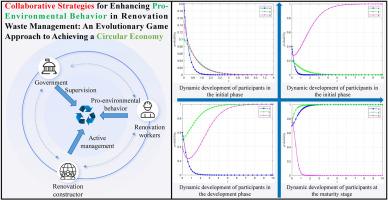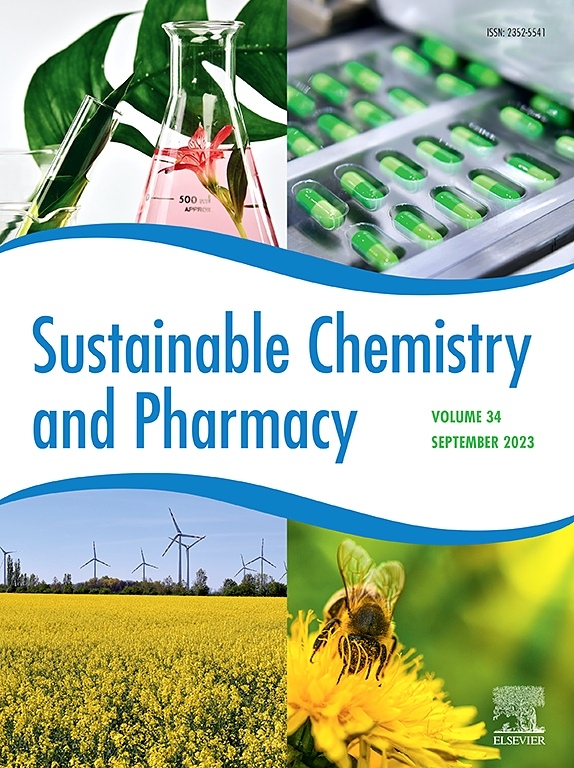在翻新废物管理中加强亲环境行为的合作策略:实现循环经济的进化博弈方法
IF 5.8
2区 化学
Q2 CHEMISTRY, MULTIDISCIPLINARY
引用次数: 0
摘要
越来越多的翻新垃圾带来了重大的环境和社会挑战,迫使政府和承包商寻找有效的解决方案。在装修工人中鼓励亲环境行为(PEB)对于从源头上减少浪费至关重要。然而,主要利益相关者、工人、承包商和地方政府之间缺乏协调和稳定的战略,阻碍了在改造现场有效实施PEB。本研究运用演化博弈模型,探讨利益相关者的动态决策过程,并提出合作策略,以提升利益相关者的决策效率。首先,构建了三个利益相关者的收益矩阵。分析了各利益相关者的均衡和稳定策略,并通过仿真评估了初始策略选择和参数变化对决策的影响。研究结果表明:(1)政府的奖惩措施对激励承包商和工人采用PEB是有效的;(2)政府对工人PEB的影响是间接的,而承包商的影响更为直接;(3)最优策略随产业发展阶段的不同而不同:早期策略的效果较差,而成熟阶段的策略会增加工人和承包商对PEB的参与,政府采取更宽松的监管手段。这些见解建议采取针对性措施,通过多方合作实现循环经济,在装修废弃物中实现PEB。本文章由计算机程序翻译,如有差异,请以英文原文为准。

Collaborative strategies for enhancing pro-environmental behavior in renovation waste management: An evolutionary game approach to achieving a circular economy
The growing volume of renovation waste presents major environmental and societal challenges, pressing governments and contractors to find effective solutions. Encouraging pro-environmental behavior (PEB) among renovation workers is essential for reducing waste at its source. However, the lack of coordinated and stable strategies among key stakeholders, workers, contractors, and local governments impeded effective PEB implementation on renovation sites. This study utilizes an evolutionary game model to investigate these stakeholders' dynamic decision-making processes and develop collaborative strategies for enhancing PEB. Initially, a payoff matrix was constructed for the three stakeholders. Each stakeholder's equilibrium and stability strategies were analyzed, and simulations assessed the impact of initial strategy choices and parameter variations on decision-making. The findings indicate that (1) Government incentives and penalties are effective in motivating contractors and workers to adopt PEB; (2) The government's influence on workers' PEB is indirect, whereas contractors exert a more direct influence; and (3) Optimal strategies vary with the industrial development stage: early-stage strategies are less effective, while mature-stage strategies see increased engagement in PEB by workers and contractors, with the government adopting more relaxed regulatory approaches. These insights suggest targeted measures to achieve PEB in renovation waste through multi-party collaboration to realize a circular economy.
求助全文
通过发布文献求助,成功后即可免费获取论文全文。
去求助
来源期刊

Sustainable Chemistry and Pharmacy
Environmental Science-Pollution
CiteScore
8.20
自引率
6.70%
发文量
274
审稿时长
37 days
期刊介绍:
Sustainable Chemistry and Pharmacy publishes research that is related to chemistry, pharmacy and sustainability science in a forward oriented manner. It provides a unique forum for the publication of innovative research on the intersection and overlap of chemistry and pharmacy on the one hand and sustainability on the other hand. This includes contributions related to increasing sustainability of chemistry and pharmaceutical science and industries itself as well as their products in relation to the contribution of these to sustainability itself. As an interdisciplinary and transdisciplinary journal it addresses all sustainability related issues along the life cycle of chemical and pharmaceutical products form resource related topics until the end of life of products. This includes not only natural science based approaches and issues but also from humanities, social science and economics as far as they are dealing with sustainability related to chemistry and pharmacy. Sustainable Chemistry and Pharmacy aims at bridging between disciplines as well as developing and developed countries.
 求助内容:
求助内容: 应助结果提醒方式:
应助结果提醒方式:


